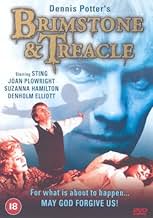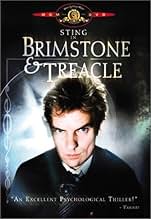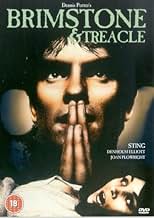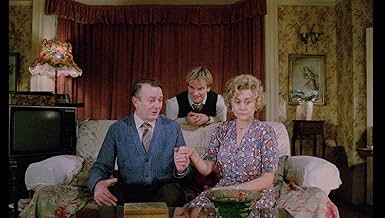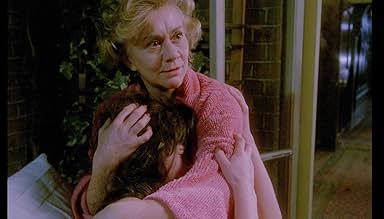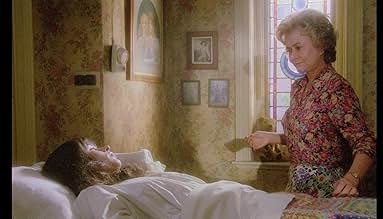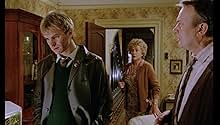NOTE IMDb
6,4/10
1,8 k
MA NOTE
Ajouter une intrigue dans votre langueA strange young man has a sinister effect on the family of a middle-aged writer.A strange young man has a sinister effect on the family of a middle-aged writer.A strange young man has a sinister effect on the family of a middle-aged writer.
- Réalisation
- Scénario
- Casting principal
- Récompenses
- 1 victoire et 2 nominations au total
Avis à la une
7jlaw
The film is re-make of a television play which the BBC chose not to transmit because of its controversial subject matter, in particular the final sequence of rape. This version which received a cinema release, appeared 6 years later, and included one member of the original cast, Denholm Elliot.
The central role of Martin was re-cast with Sting (then lead singer with The Police) who also provided music material, including his first solo single Spread A Little Happiness. (Michael Nyman also provided soundtrack material.)
The script remains largely faithful to the original screenplay, though several minutes of discourse in one of the final scenes is excised completely. This is a discussion of racism which provokes Mr Bates to retract from his outspoken racist views.
The original TV play is set mostly within the confines of a living room, while the
bigger-budget movie is less restricted, and has a Gothic, sinister atmosphere. References to Martin's diabolical nature are more subtle too the TV play shows Martin with hairy, clawed feet. The closing scene of the film suggests that Martin may have been caught out (by an angel or devil?), while the TV play implies that his actions within the Bates household are just one of many continuing abuses on a never-ending cycle.
The central role of Martin was re-cast with Sting (then lead singer with The Police) who also provided music material, including his first solo single Spread A Little Happiness. (Michael Nyman also provided soundtrack material.)
The script remains largely faithful to the original screenplay, though several minutes of discourse in one of the final scenes is excised completely. This is a discussion of racism which provokes Mr Bates to retract from his outspoken racist views.
The original TV play is set mostly within the confines of a living room, while the
bigger-budget movie is less restricted, and has a Gothic, sinister atmosphere. References to Martin's diabolical nature are more subtle too the TV play shows Martin with hairy, clawed feet. The closing scene of the film suggests that Martin may have been caught out (by an angel or devil?), while the TV play implies that his actions within the Bates household are just one of many continuing abuses on a never-ending cycle.
This film was never around much at the time of it's release dispite some good word of mouth. It is pretty well brought off in every way, but leaves one feeling one has seen a rather more obvious version of Pinter with then trendy rock and an even more pronouced lack of point.
Sting holds his own surprisingly well with his classy co-stars.. It's Potter's heavy handed irony, admittedly popular, that just tires you out.
Sting holds his own surprisingly well with his classy co-stars.. It's Potter's heavy handed irony, admittedly popular, that just tires you out.
I really enjoyed Denholm Elliott's performance in this film. He's so bitter and gnarled up that his outbursts are brilliant and quite funny.
Obviously the sick manner of the story is the same as the Play for Today, it's delivered well if not as successful as the TV version, although I've not seen that version for a long time so maybe the memory cheats a little.
Nothing wrong with Stings performance in this film but he he just didn't have the screen presence for me to completely convince.
I enjoyed this film more than I expected and it's good to see it get a repeat here in the UK on London Live channel. 7/10.
Nothing wrong with Stings performance in this film but he he just didn't have the screen presence for me to completely convince.
I enjoyed this film more than I expected and it's good to see it get a repeat here in the UK on London Live channel. 7/10.
Polite, mannered drifter Martin Taylor (Sting) charms his way into the home of Thomas Bates (Denholm Elliott), an outwardly upright publisher of religious text, his simple-minded, devout wife Norma (Joan Plowright) and their catatonic daughter Patricia (Suzanna Hamilton), whom he claims to know. Martin is allowed to stay in the home for a couple of days, cooks, cleans, "cares" for the daughter and tries to help the couple through their marital problems, but he's also the catalyst that forces some dark secrets out of the family closet.
Sting's character will either annoy or fascinate you as he exists solely as an enigma, representing angel or demon, or possibly both. Originally a play, this film never quite escapes the stage, but that only feeds into the claustrophobia of the stuffy household and guilt-ridden, lonely characters who inhabit it, and, all in all, it's an intriguing allegory on the nature of good and evil that has a lot to offer, including potent religious imagery, a knockout nightmare/fantasy sequence and a good score (plus songs by The Police) all driven home by excellent performances by the three leads and assured direction by Richard Loncraine.
Dennis Potter's script was previously filmed in 1976 for BBC (that version also starred the great Denholm Elliott).
Sting's character will either annoy or fascinate you as he exists solely as an enigma, representing angel or demon, or possibly both. Originally a play, this film never quite escapes the stage, but that only feeds into the claustrophobia of the stuffy household and guilt-ridden, lonely characters who inhabit it, and, all in all, it's an intriguing allegory on the nature of good and evil that has a lot to offer, including potent religious imagery, a knockout nightmare/fantasy sequence and a good score (plus songs by The Police) all driven home by excellent performances by the three leads and assured direction by Richard Loncraine.
Dennis Potter's script was previously filmed in 1976 for BBC (that version also starred the great Denholm Elliott).
British middle-agers with a handicapped daughter invite into their home a strange young man who holds a curious power over the family. Sting (vocalist and bassist with The Police) gives a commendable performance--his first lead--in this Dennis Potter concoction based upon the writer's own play (originally taped--and banned--by the BBC). Writing like a mischievous child, and aiming for lofty subtext and ironic turns of the screw, Potter doesn't always get the affects he's aiming for, but neither does he disappoint. Director Richard Loncraine doesn't struggle too noticeably getting this peculiar material off the dime (and out from the main set), while his build-up to the foregone conclusion is rife with interesting, twisted bits of business. Not a barn-burner by any means, but a handsome, calculated work in a minor, if derivative key. **1/2 from ****
Le saviez-vous
- AnecdotesDavid Bowie was the first choice to play Martin Taylor.
- Crédits fousOpening credits are listed on the pages of a book floating on moving water.
- ConnexionsFeatured in Zomergasten: Épisode #10.5 (1997)
Meilleurs choix
Connectez-vous pour évaluer et suivre la liste de favoris afin de recevoir des recommandations personnalisées
- How long is Brimstone & Treacle?Alimenté par Alexa
Détails
- Date de sortie
- Pays d’origine
- Langue
- Aussi connu sous le nom de
- Brimstone: Inkräktaren
- Lieux de tournage
- Sociétés de production
- Voir plus de crédits d'entreprise sur IMDbPro
- Durée
- 1h 27min(87 min)
- Couleur
- Mixage
- Rapport de forme
- 1.66 : 1
Contribuer à cette page
Suggérer une modification ou ajouter du contenu manquant


